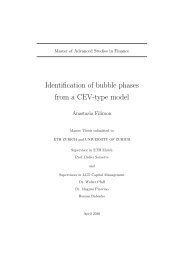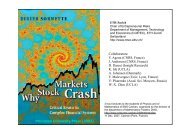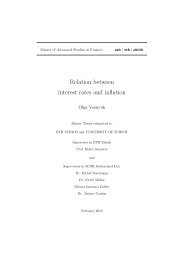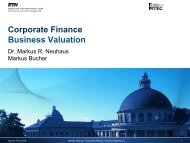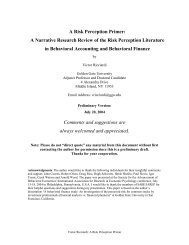Tail Dependence - ETH - Entrepreneurial Risks - ETH Zürich
Tail Dependence - ETH - Entrepreneurial Risks - ETH Zürich
Tail Dependence - ETH - Entrepreneurial Risks - ETH Zürich
Create successful ePaper yourself
Turn your PDF publications into a flip-book with our unique Google optimized e-Paper software.
whenever the relevant expectations exist [10] (1983). If the random variables X1, . . ., Xd<br />
have a MEV distributions, then they are associated.<br />
A MEV distribution G satisfies the condition:<br />
d�<br />
G (x1, . . .,xd) ≥ Gi (xi) (2.18)<br />
for all x ∈ R d . The forms of limiting multivariate distributions correspond to the cases<br />
of (asymptotic) total independence:<br />
G (x1, . . .,xd) =<br />
and (asymptotic) total dependence:<br />
i=1<br />
d�<br />
Gi (xi) (2.19)<br />
i=1<br />
G (x1, . . .,xd) = min {G1 (x1) , . . .,Gd (xd)} (2.20)<br />
between the component wise maxima for all x ∈ R d . For further details concerning<br />
asymptotic total dependence and asymptotic total independence we refer to [6] (2000)<br />
and [10] (1983).<br />
Pairwise independent random variables having a joint MEV distribution are mutually<br />
independent. Thus the study of asymptotic independence can be confined to the<br />
bivariate case.<br />
Asymptotic total independence arises only if equation (2.7) holds, and there exists<br />
x ∈ R d such that 0 < Gi (xi) < 1 for i = 1, . . ., d and<br />
F n (an,1 + bn,1 · x1, . . .,an,d + bn,d · xd) n→∞<br />
−→ G1 (x1) · · ·Gd (xd) (2.21)<br />
Moreover equation (2.19) only holds for any x ∈ R d if<br />
G(0, . . .,0) = G1(0), · · ·Gd(0) = exp(−d) (2.22)<br />
provided that Gi are standard Gumbel distributions or<br />
provided that Gi are Fréchet distributions or<br />
G(1, . . .,1) = G1(1), · · ·Gd(1) = exp(−d) (2.23)<br />
G(−1, . . .,−1) = G1(−1), · · ·Gd(−1) = exp(−d) (2.24)<br />
(2.25)<br />
provided that Gi are Weibull distributions 3 (2007).<br />
Similar conditions hold for the case of asymptotic total dependence. Asymptotic<br />
dependence arises only if equation (2.7) holds, and there exists x ∈ R d such that<br />
0 < G1 (x1) = · · · = Gd (xd) < 1 and<br />
F n (an,1 + bn,1 · x1, . . .,an,d + bn,d · xd) n→∞<br />
−→ G1 (x1) (2.26)<br />
3 The distinction between these three types of distributions belongs to the field of univariate extreme value<br />
Theory and is explained in i.e. Theorem 1.7 of chapter 1.2 of [3]<br />
8



